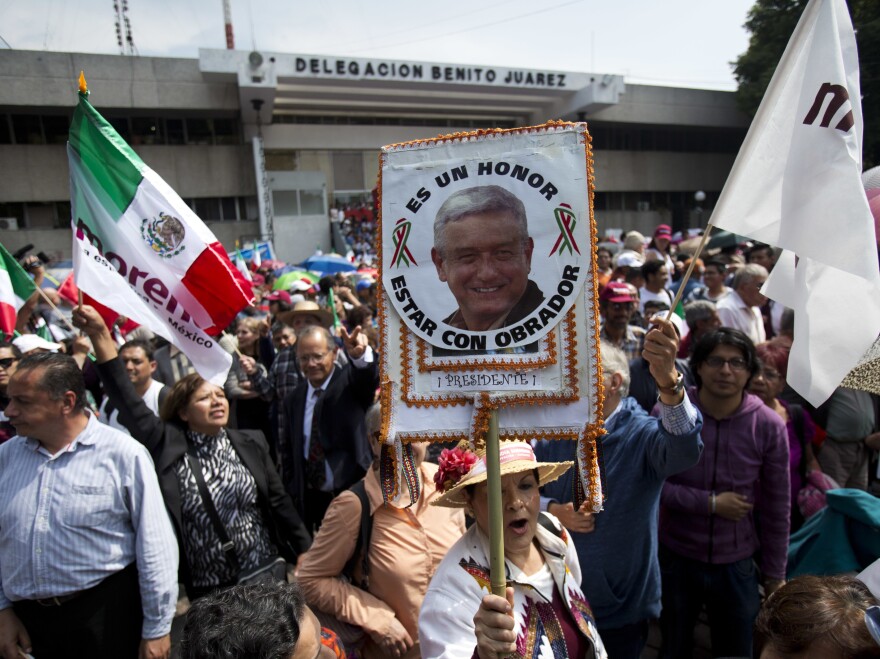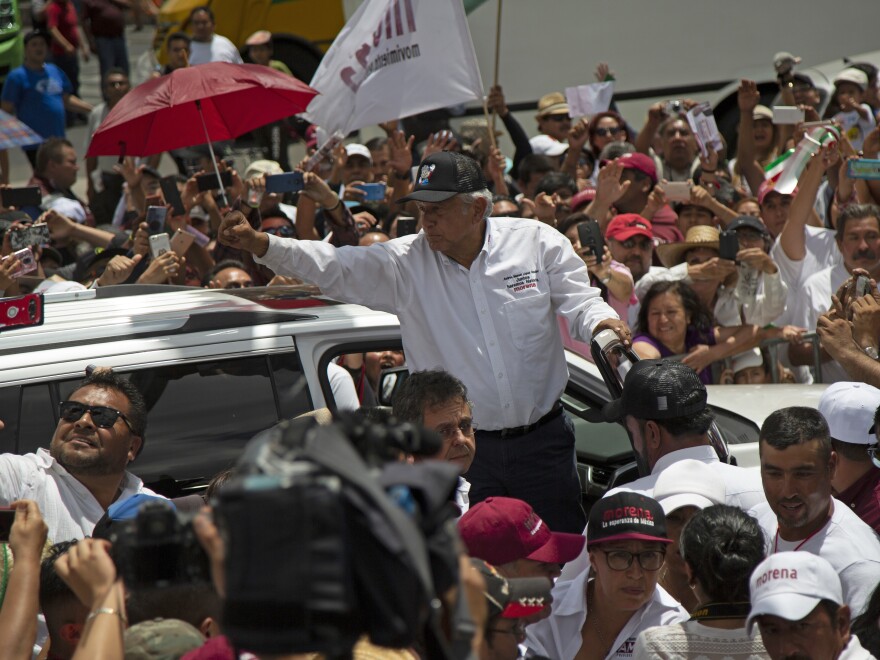If the polls are right, Mexico's next president will be a veteran leftist for whom the third time may very well be the charm.
Andrés Manuel López Obrador is running for president once again. But this time around, it appears his populist message is striking a chord with Mexicans exasperated with disturbing levels of violence and corruption.
Polls now put López Obrador at least 15 points ahead of his nearest rival, Ricardo Anaya of the right-of-center National Action Party.
His loyal followers are confident their time has finally come. They scream, "President! President!" as he takes the stage at a recent campaign rally in the northern industrial city of Monterrey.
Launching into his standard stump speech and slow cadence, López Obrador, 64,tells the crowd he's nothing like the politicians and elites who have plunged Mexico into such disrepair.
"I am just like you, I came from the bottom, and now I am here to represent you in this historic moment," he says to great applause.
López Obrador vows to end corruption. He says he will boost social programs for the poor, scholarships for students and larger pensions for the elderly.
At times, he even sounds like Mexico's main antagonist, President Trump. López Obrador isn't a fan of free-trade agreements and frequently works up his base — those displaced by globalization — vowing to revive Mexico's farms and boost industrial worker's low wages, with pledges of free fertilizer and cheap gas prices.
He is short on specifics of how to pay for everything, suggesting he will use money saved from fighting corruption and cutting bureaucracy, which has left some economists skeptical. But he is clearly winning over a broad base of voters.
Eduardo García de León, 64, a retired teacher, likes what he hears. He says politicians are only out to enrich themselves. "If he can end corruption, Mexico can finally get ahead," says García de León.

López Obrador's fight against what calls the "mafia of power" has put Mexico's business elites and foreign investors on edge. They cringe at his pledges to review Mexico's recent energy reform allowing foreign investment in the country's oil industry. López Obrador says he'll review all contracts before letting more oil and gas auctions go forward. And he frequently talks about putting the brakes on the new, multibillion-dollar international airport being built in Mexico City. He says he wants to review the current contracts for corruption.
López Obrador's anti-establishment, anti-corruption rhetoric has long been central to his politics, which began in the southern state of Tabasco, where he grew up in a small town. He made a name for himself locally, supporting indigenous rights and protesting against corruption in politics.
After two failed bids for governor in the 1980s and 1990s, he finally won his first major election in 2000 to become mayor of Mexico City. His tenure got high marks from residents, as he provided pensions for the elderly and built a second story onto the capital's clogged highways. He left office with an 80 percent approval rating.
His foray into presidential politics wasn't as successful. In 2006, he lost his first bid by less than a percentage point, and went on to dispute the results and stage his own swearing-in ceremony. Six years later, he ran again and lost to the current leader. President Enrique Peña Nieto cannot constitutionally seek another term.
López Obrador depicts this third attempt at the presidency as a historical battle for Mexico, akin to achieving independence from Spain and the 1910 Revolution.
"We are now in a position like never before to finally achieve real change," López Obrador tells the rally in Monterrey.
Conditions in the country have deteriorated over the past 12 years while voters ping-ponged between Mexico's two major parties. Homicide rates are at a historic high, corruption scandals too, and the economy isn't doing well either. Last year, Mexico's gross domestic production rose by only 2 percent, while the peso has been taking a beating, trading recently above 20 to the dollar.
"The stars have aligned for López Obrador to have a great performance in this election," says Carlos Bravo Regidor, a political analyst at the Center for Research and Teaching in Economics in Mexico City. He says voters' contempt for the political establishment outstrips any lingering fear they may have of López Obrador.
"More than fear, the predominant feeling with Mexican voters is anger, and López Obrador has become the candidate that angry people are coalescing around," he says.
That hasn't stopped challengers, especially the governing Institutional Revolutionary Party's candidate José Antonio Meade, from pulling out its old playbook.

In a recent campaign ad, a split frame is seen with Venezuela's late firebrand leftist Hugo Chávez on one side and López Obrador on the other. The audio is edited to show each leader pitching similar populist promises, including the Mexican candidate's pledge to hold a national referendum on his performance every two years.
The scare tactic doesn't seem to be working. Polls show Meade consistently trailing in a distant third place.
And López Obrador seems to have learned from previous campaign blunders. He has kept control of any outbursts and looks calm and relaxed in recent debates, unlike the time he once told a rival candidate to shut up.
He's worked hard to appease business and political elites, promising to keep spending in check and continue negotiations with the U.S. and Canada to preserve the North American Free Trade Agreement. He's even formed an alliance with the country's ultra-conservative evangelical Christian party, shoring up support from a large part of the electorate, Mexico's religious right, that was once reluctant to back him. That move drew criticism from some progressives.
Still, with less than a month to go before the July 1 election, Jessica Ramírez, a housewife in the northern state of Nuevo León, says she hasn't decided whom to vote for.
"For me, combating crime is top on my list, that's what is affecting us most these days," she says.
So far, she hasn't heard any of the candidates give specifics on how they are going to stop the violence.
Copyright 2021 NPR. To see more, visit https://www.npr.org. 9(MDA4MDc0NDkyMDEzMTQ4ODU0MTE0OGNiNg004))



